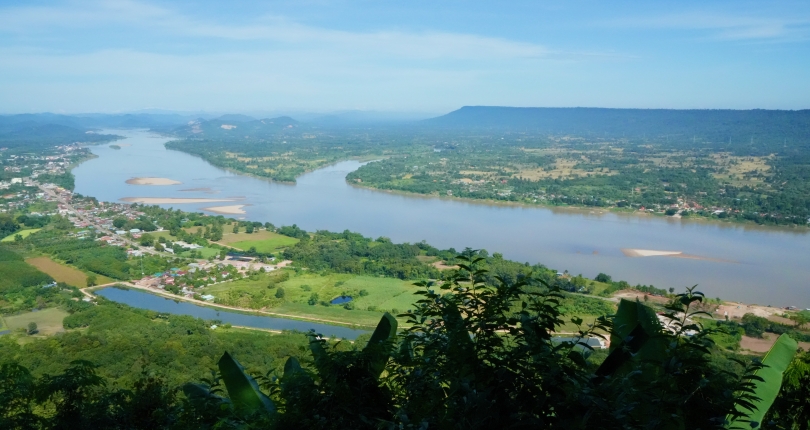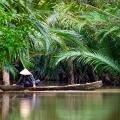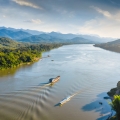Forging transboundary alliances in the Mekong Region
After two decades of dedicated work in the Mekong Region, the Sustainable Mekong Research Network (SUMERNET) has evolved into a robust transboundary alliance, co-producing knowledge to influence policy. What new opportunities and challenges lie ahead?
From a small seed
Just as a small seed grows into a mighty tree, SUMERNET has grown from its inception in 2015 with 14 members into an expanded, living network that provides scientific evidence to policymakers on critical regional topics from climate vulnerability and transboundary water storage to urban floods, wetlands and groundwater management.
As of May 2024, SUMERNET has 765 members representing a wide range of people, cultures and professional sectors from Cambodia, China, Lao PDR, Myanmar, Thailand and Vietnam, as well as beyond the Mekong Region. As the infographic below shows, more than 80 projects have received grants for research and policy engagement to work on environmental sustainability across borders.

Dr. Chu Thai Hoanh, former chair of the SUMERNET Steering Committee (SSC), explained that: “SUMERNET has the characteristic of rational integration - the systematic and logical combination of different elements to create an efficient whole. Most projects funded by SUMERNET were carried out in at least two Mekong countries, thus involving researchers from different nationalities.”
Two years ago, like a tree stretching further outward, the Mekong program of work has branched out into the Mekong Thought Leadership and Think Tanks Network Program (MTT) that seeks to work with national and regional Knowledge-based Policy Influence Organizations (KBPIOs).
Nexus approach
At the SUMERNET Learning Forum 2024 in Bangkok, Thailand, researchers, policymakers, think tanks and local community partners reflected on how to effectively nurture a regional transboundary alliance.
Dr. Suriyan Vichitlekarn, Executive Director of the Mekong Institute based in northeast Thailand’s Khon Kaen, and a partner of the alliance, pointed out an untapped potential of the network that lies in gestation, suggesting that network’s knowledge products should center around the concept of nexus, such as Water-Energy-Climate (WEC) or Water-Energy-Food (WEF) nexus.
"Nexus" comes from the Latin word "nectere", meaning "to bind” or “to tie". That means, within the WEC Nexus, a series of connections between water, energy and climate needs to be understood, managed, and strengthened for sustainable solutions.
The Nexus approach suggests that “we need to work among sectors and identify tradeoffs, then minimize tradeoffs,” according to Dr. Suriyan.
SUMERNET’s policy engagement coordinator, Dr. Ridhi Saluja, agreed with this approach: “In our current projects, we've observed a focus on specific sectors, preventing us from seeing the bigger picture.”
SUMERNET has integrated the nexus approach in their ambitions for the next phase - SUMERNET PLUS, which is short for “Partnership for Long-term Climate-Resilient Mekong Through Just and Sustainable Transitions”. The new phase aims to place greater emphasis on enhancing climate resilience across the Mekong Region.

Diverse networks, diverse knowledge
There are several regional intergovernmental cooperation mechanisms in the Mekong Region, each focusing on various aspects of development, security, and environmental sustainability.
Currently, about fifteen active cooperative mechanisms are divided into two groups: intra-regional mechanisms (cooperation among Mekong countries) and mechanisms between Mekong countries and non-basin partners. The Mekong River Commission (MRC), the Greater Mekong Subregion (GMS) and the Lancang-Mekong Cooperation (LMC) are the three most active mechanisms 1.
At the local or civil society level, two NGO coalitions, Vietnam Rivers Network and Rivers Coalition in Cambodia play critical roles in fostering regional cooperation among Mekong countries to address shared environmental challenges and protect vital river ecosystems. For instance, in 2010s, the two had adopted advocacy strategies at the national and regional levels to lobby against the building of dams on the mainstream Mekong River including the Xayaburi dam in Lao PDR 2.
In December 2020, the Mekong People’s Forum was formed but has since been dormant. More recently, in early 2024, the Hug Mekong Network was formed as a cross-border civil society grouping that would “strengthen relationships along both banks of the Mekong River through increased cooperation among public, private, and government agencies to conserve and sustain the river’s resources.”
Other regional cooperation mechanisms also involve global environmental networks, such as the International Union for Conservation of Nature (IUCN) that has served as the secretariat for the Indo-Burma Ramsar Regional Initiative (IBRRI) to support the transboundary conservation and sustainable use of wetlands between Cambodia, Lao PDR, Thailand, Vietnam, and Myanmar since 2016.
Connecting knowledge to policymaking
By engaging with these mechanisms at the intergovernmental and civil society levels, regional alliances can become stronger and, in particular, will be able to connect different sources and types of knowledge to policy making.
As Pakorn Lertsatienchai, an academic from Chulalongkorn University pointed out recently: “Co-produced knowledge is the way we learn from local people and exchange ideas. For example, local people may know more about ecology and their own environment.”
This concept is well-illustrated by the Thai Baan research, which is a grassroots approach where village communities themselves conduct research on their environment and interactions with their lands and forests. Initiated in 2000 when the Thai government agreed to open the Pak Mun Dam sluice gates, this approach later extended to Cambodia (known as "Sala Phoum”) and Vietnam to empower local people to share their environmental wisdom and influence policy 3.

Mekong citizens are powerful players, in terms of both knowledge co-production and policy engagement. Citizen science and open science can empower grassroots communities to contribute to the just and sustainable transition. Besides, the histories and cultures of the Mekong Region, including domestic and indigenous knowledge, can significantly contribute to this effort.
These challenges and opportunities need to be weighed up when designing the regional alliance, a vision that SUMERNET is determined to realize as it continues its work building transboundary alliances in the Mekong Region.
Notes:
1. Jia, S., Wang, Y., Do, H., Gojenko, B., Man, C. (2024). Basin Governance and International Cooperation. In: Chen, D., Liu, J., Tang, Q. (eds) Water Resources in the Lancang-Mekong River Basin: Impact of Climate Change and Human Interventions. Springer, Singapore. https://doi.org/10.1007/978-981-97-0759-1_9
2. Yasuda, Yumiko. (2014). Formal rules, informal norms and advocacy strategies of NGOs: Lessons from the Mekong River. 10.13140/RG.2.1.1317.5848.
3. Myint, Tun. (2016). Citizen Science in a Democracy: The Case of Thai Baan Research. Tocquevill Lecture. https://ostromworkshop.indiana.edu/pdf/seriespapers/2016F_Tocq/Myint%20paper.pdf. Accessed October 02, 2024; and Mahr, D. (2021). Thai Baan Research: Locality as a Key for Diversity. In: The knowledge of experience . Palgrave Macmillan, Singapore. https://doi.org/10.1007/978-981-16-3702-5_5
*Photo 1: The confluence of the Mekong River near the Thailand-Laos border. Photo: Rajesh Daniel / SEI Asia.
*Photo 2: SUMERNET in Numbers as of May 2024. Graphic: SEI Asia.
*Photo 3: SUMERNET members engaged in a discussion at the SUMERNET Learning Forum 2024. Photo: SEI Asia.
*Photo 4: Farmers in the upper Mekong Delta in Vietnam tested alternate wetting and drying as a water-saving technique. Photo courtesy of the project "Out-scaling Water Saving Innovations to Reduce Water Insecurity Conditions of Poor and Marginalised Communities in Vietnam’s Upper Mekong Delta" (JA-Water Savings).
You might be interested in
-
Grants open for research linking to policy action under Mekong Thought Leadership and Think Tanks Network Program
Mekong Thought Leadership and Think Tanks (MTT) Network Program calls for applications to its research-to-policy grants supporting evidence-based research that connects to practical solutions to challenges in the water-energy-climate nexus.
![Grants open for research linking to policy action under Mekong Thought Leadership and Think Tanks Network Program]()
-
Now open: fellowship opportunities under Mekong Thought Leadership and Think Tanks Program
MTT Program is opening a call for fellowships to be hosted in Cambodia, Lao PDR, Thailand, and Vietnam. The Program will award up to 13 high-quality entry- or mid-level professionals of all genders who are Mekong citizens.
![Now open: fellowship opportunities under Mekong Thought Leadership and Think Tanks Program]()
-
Call for 3rd batch applications: fellowship opportunities under Mekong Thought Leadership and Think Tanks Program
MTT Program is opening a call for fellowships to be hosted in Cambodia, Lao PDR, Thailand, and Vietnam. The Program will award up to 13 high-quality entry- or mid-level professionals of all genders who are Mekong citizens.
![Call for 3rd batch applications: fellowship opportunities under Mekong Thought Leadership and Think Tanks Program]()
 By
By 







 Read more about SUMERNET
Read more about SUMERNET
